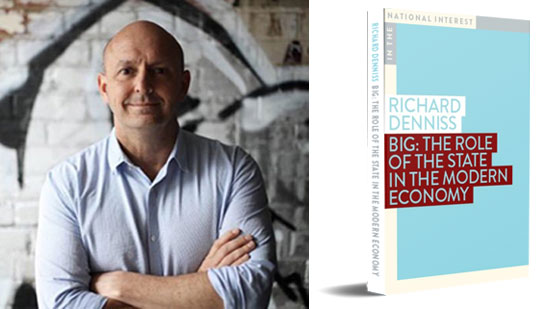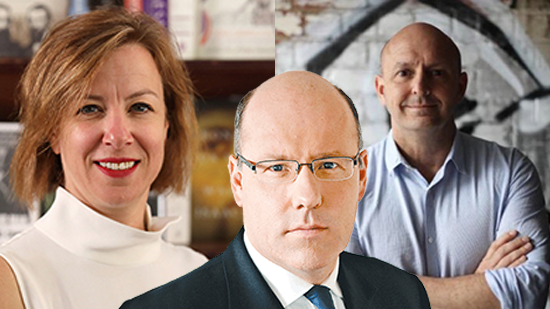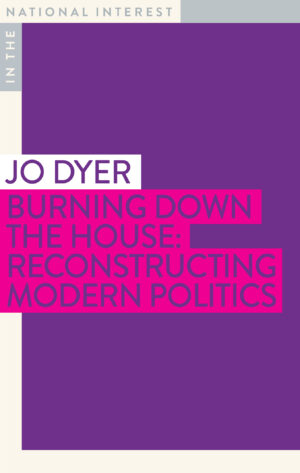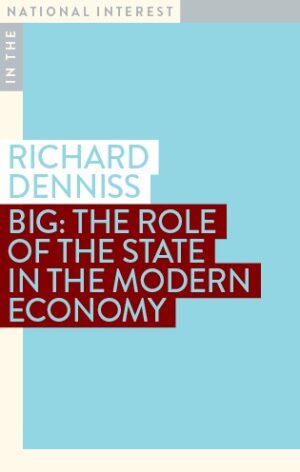

Defence, infrastructure, education, health and aged care, not to mention environmental safeguards and climate change mitigation. All these things require public money as well as clever thinking. Richard Denniss says the message that governments need to get out of the way has led to the shrinking of creativity and standards. He talks to Julie Rudner about why the time is right to reinvigorate the public sector. What could a bigger government do?
-
Big
Richard Denniss

Please note: this event is being held online.
Join us to hear Dr Richard Denniss, Chief Economist at The Australia Institute, Australia’s foremost public policy think tank. Richard is renowned for his ability to clearly explain complicated economic ideas and develop creative new solutions. His latest essay, Big: The Role of the State in the Modern Economy tells us it is time to jettison the obsession with the ‘unfinished reform agenda’ of the 1990s. Rather we must now consider the breadth and depth of the new challenges confronting Australia, and to chart a course in which governments take more responsibility for solving the problems that will dominate Australian lives in the years ahead.
Richard will be in conversation with Mark Rubbo.
This event is free to attend but bookings are essential.
Attendees will be sent a promo code to claim $5 off the price of the book when they receive the link to the event. This code will be valid until 24 hours after the event has ended. When purchasing in store, simply mention the discount code or show your digital ticket at the counter to receive the discount.
-
Big
Richard Denniss

Scott Morrison wants to spend a lot more money on defence, the business community wants more spending on infrastructure and education, an ageing population wants better health and aged care, and young Australians want more action on climate change and affordable housing. Each problem requires more public spending, but for decades Australians have been told that the less government spends, the better their lives will be.
Furthermore, while spending more money will be essential to fund more submarines, aged-care nurses and infrastructure, money alone will not solve the problems faced by Australia. Decades of declining standards of accountability and transparency, of privatisation, deregulation and tax cuts, combined with a lack of energy in strengthening the positive role of government, have led to apathy among the public and parliamentarians. We have allowed our public institutions to shrink and atrophy, and our creativity to wane in choosing not just which services government should provide but how best to provide them.
There is a clear alternative: follow the lead of the Nordic countries in the provision of great public health, education, housing and infrastructure, and in doing so boost economic productivity and deliver higher standards of living at lower cost.
It is time to jettison the obsession with the ‘unfinished reform agenda’ of the 1990s, to consider the breadth and depth of the new challenges confronting Australia, and to chart a course in which governments take more responsibility for solving the problems that will dominate Australian lives in the years ahead. We must abandon decades of denial that the public sector can play a bigger and better role in improving our lives. To build the bigger government these times demand, we must first abandon the baggage of the past.
Dr Richard Denniss is Chief Economist at The Australia Institute, Australia’s foremost public policy think tank. Richard is renowned for his ability to clearly explain complicated economic ideas and develop creative new solutions. A former associate professor at the Crawford School of Economics and Government at the Australian National University, Richard also worked as chief of staff for the then leader of the Australian Democrats, senator Natasha Stott Despoja, and as strategy adviser to the then leader of the Australian Greens, senator Bob Brown, as well as working as a consultant, company director and strategy adviser in the private sector. A prolific writer, Richard regularly contributes to The Guardian, The Australian Financial Review, The Saturday Paper and The Monthly. He has written or co-written six books, including the bestselling Affluenza: When too Much Is Never Enough and Econobabble: How to Decode Political Spin and Economic Nonsense.
-
Big
Richard Denniss

SPEAKERS
Richard Denniss, Renate Egan, Andrew Blakers
HOST
Nick Feik
Reducing our emissions by making everything electric won’t just benefit the climate, it’s going to be great for everyone. In the long run, electrifying everything is cheaper and more efficient. We can get to 80 per cent emissions reductions by 2035 and we don’t need any new technology at all. So what are we waiting for?
-
Big
Richard Denniss

Scott Morrison wants to spend a lot more money on defence, the business community wants more spending on infrastructure and education, an ageing population wants better health and aged care, and young Australians want more action on climate change and affordable housing. Each problem requires more public spending, but for decades Australians have been told that the less government spends, the better their lives will be.
Furthermore, while spending more money will be essential to fund more submarines, aged-care nurses and infrastructure, money alone will not solve the problems faced by Australia. Decades of declining standards of accountability and transparency, of privatisation, deregulation and tax cuts, combined with a lack of energy in strengthening the positive role of government, have led to apathy among the public and parliamentarians. We have allowed our public institutions to shrink and atrophy, and our creativity to wane in choosing not just which services government should provide but how best to provide them.
There is a clear alternative: follow the lead of the Nordic countries in the provision of great public health, education, housing and infrastructure, and in doing so boost economic productivity and deliver higher standards of living at lower cost.
It is time to jettison the obsession with the ‘unfinished reform agenda’ of the 1990s, to consider the breadth and depth of the new challenges confronting Australia, and to chart a course in which governments take more responsibility for solving the problems that will dominate Australian lives in the years ahead. We must abandon decades of denial that the public sector can play a bigger and better role in improving our lives. To build the bigger government these times demand, we must first abandon the baggage of the past.
-
Big
Richard Denniss








